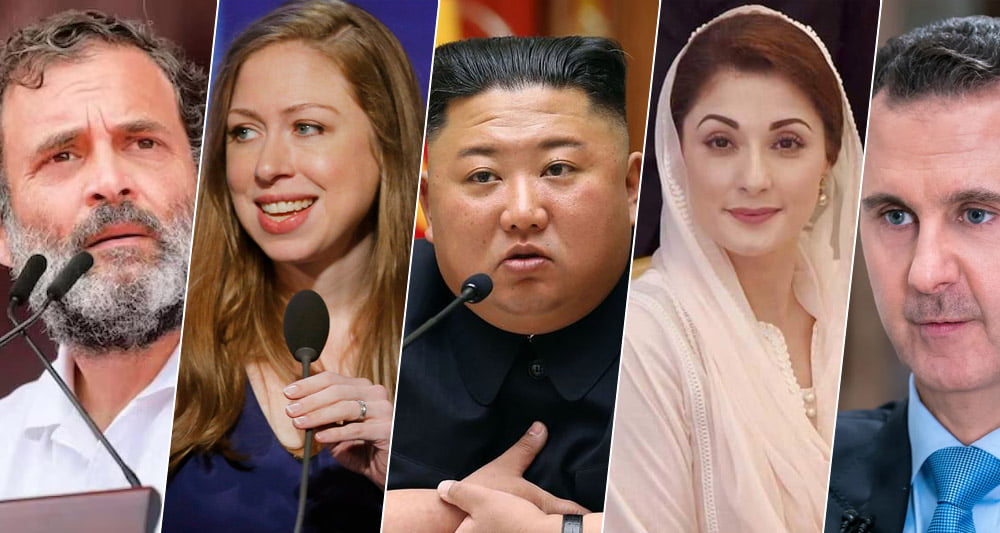10 Most Notorious Cases of Political Nepotism

Political nepotism is a persistent problem in modern politics that affects many countries around the world. Political nepotism happens when family members of politicians are given preferential treatment. They are often appointed to important positions, even if they are less qualified than other candidates. This type of favoritism in politics has led to widespread corruption and has eroded public trust in government institutions. In this article, we will explore the 10 most notorious cases of political nepotism and examine the impact it has had on the countries involved.
How does political nepotism affect a country?
The negative effects of political nepotism on a country can be far-reaching and long-lasting. Appointing unqualified family members to positions of power undermines the merit-based system that is necessary for a healthy democracy to function. This often leads to ineffective governance and corruption, as corrupt politicians use their positions to enrich themselves and their families at the expense of the general public. Furthermore, nepotism in modern politics can perpetuate family dynasties and stifle new talent and ideas. This impedes the opportunity for a diverse range of voices to be heard. Overall, political nepotism is a cancer that eats away at the fabric of society and weakens the foundations of democracy.
Are you tired of hearing about corrupt politicians and their family politics? Well, brace yourself for our list of the 10 most notorious cases of political nepotism. From blatant favoritism in politics to shocking examples of political corruption, these stories will keep you on the edge of your seat. So come and join us as we uncover the dark side of nepotism in modern politics and the corrupt politicians who perpetuate it.
- Maryam Nawaz Sharif (Pakistan)
- Chelsea Clinton (United States)
- Rafael Moreno Valle (Mexico)
- Park Geun-hye (South Korea)
- Gamal Mubarak (Egypt)
- Bongbong Marcos (Philippines)
- Bashar al-Assad (Syria)
- Rahul Gandhi (India)
- Isabel dos Santos (Angola)
- Kim Jong-un (North Korea)
10 Kim Jong-un (North Korea)

Kim Jong-un, the leader of North Korea, has well-documented political nepotism, promoting and appointing family members to high-ranking government positions. This has led to criticism and allegations of corruption in his administration. Kim Yo-jong, his younger sister, is an example of his nepotism. She lacks experience and qualifications but has significant political power, involved in high-level talks with South Korea and the United States, and promoted to the highest decision-making body of the ruling Workers’ Party of Korea. The regime executed Jang Song-thaek (Kim Jong-un’s uncle) on charges of corruption. Before that, he was one of the most powerful figures in North Korea.
Kim Jong-un’s nepotism has damaged North Korea’s economy and society. His focus on promoting family members and loyalists has stifled new talent and ideas. This has resulted in a lack of innovation and progress in the country. Additionally, the corruption and favoritism in his administration have worsened the already dire economic conditions in North Korea, leading to widespread poverty among its citizens. His actions have had a severe impact on North Korea, both economically and socially, causing devastating consequences for its citizens who continue to suffer under his regime.
9 Isabel dos Santos (Angola)

Isabel dos Santos, the daughter of former Angolan President Jose Eduardo dos Santos, engaged in political nepotism, corruption, and favoritism during her tenure. She used her immense wealth and family connections to control Angola’s key industries and institutions. As the head of Sonangol, the state-owned oil company, Isabel dos Santos awarded contracts to her friends and family members, bypassing competitive bidding processes. She also allegedly embezzled millions of dollars from the company’s accounts for her personal gain.
Isabel dos Santos extended her political nepotism to other industries, appointing her half-brother to head the country’s sovereign wealth fund and giving her husband control over the largest mobile phone network, without any regard for their qualifications or experience. Her political corruption and favoritism severely impacted Angola’s economy and society, draining the country’s resources and leaving little investment in infrastructure and public services. As a result, the majority of Angola’s population lives in poverty with limited access to healthcare, education, and basic amenities.
Isabel dos Santos’ corrupt practices undermined the rule of law in Angola and eroded public trust in the country’s institutions. Her actions contributed to a culture of impunity, where those with connections to those in power acted with impunity, while ordinary citizens struggled to make ends meet. The severe impact of Isabel dos Santos’ political nepotism, corruption, and favoritism highlights the need for a merit-based system of governance prioritizing the citizens’ needs over the interests of the few in power.
8 Rahul Gandhi (India)

Rahul Gandhi, a member of the powerful Gandhi family in Indian politics, has faced accusations of political nepotism and favoritism. Due to his family connections, the Indian National Congress party appointed him to key positions despite his lack of significant achievements or qualifications.
The Congress party appointed him as Vice President in 2013 and later promoted him to President in 2017, despite his lack of prior political experience or success. Rahul Gandhi’s favoritism is evident in his appointments of close family friends and loyalists to key positions within the Congress party, without regard for their qualifications or experience.
He has faced criticism for corruption allegations, including using his family connections and wealth to benefit himself and his allies in the party. His business dealings have also come under scrutiny, with allegations of impropriety and conflicts of interest.
Rahul Gandhi’s political nepotism has had a significant impact on India. The lack of merit-based appointments and promotion of unqualified individuals has stagnated progress and innovation within the Congress party. Family politics has eroded public trust in the political process and contributed to a culture of corruption and favoritism in Indian politics.
7 Bashar al-Assad (Syria)

Bashar al-Assad, the President of Syria, has faced numerous accusations of political nepotism, corruption, and favoritism throughout his tenure. He has used his family connections and authority to secure important positions within the Syrian government and military for his family and associates.
His political nepotism is evident in the appointment of his family members to key positions within the government. His brother, Maher al-Assad, holds a high-ranking position in the Syrian military, and his cousin, Rami Makhlouf, was a powerful businessman until he fell out of favor with the regime.
Bashar al-Assad’s corrupt political practices and favoritism have had a devastating impact on Syria. His regime’s corruption has enriched himself and his inner circle while ignoring the needs of the Syrian people. Additionally, his brutal crackdown on peaceful protests in 2011 sparked the Syrian Civil War, resulting in the displacement of millions of Syrians and the loss of countless lives.
Bashar al-Assad has been accused not only of political corruption but also of committing human rights abuses against the Syrian people. His actions have left the country in ruins, with a damaged economy and a traumatized population. A merit-based governance system that prioritizes the citizens’ needs over the interests of corrupt politicians like Bashar al-Assad is desperately needed.
6 Bongbong Marcos (Philippines)

Bongbong Marcos, the son of former Philippine dictator Ferdinand Marcos, is no stranger to accusations of political nepotism, corruption, and favoritism. He and his family’s political dynasty have allowed them to hold powerful positions within the government, perpetuating the cycle of family politics and political nepotism in modern politics.
Bongbong Marcos’s political nepotism is evident in the numerous government positions he has held, from governor to congressman to senator, all while his family maintains a stranglehold on Philippine politics. This system marginalizes other qualified individuals and creates a political oligarchy that values family ties over merit.
Furthermore, Bongbong Marcos has participated in cases of political corruption and favoritism in politics. Various corruption scandals have linked him, including misusing public funds and accepting kickbacks from public works projects. His family’s wealth and influence have allowed him to grant appointments and award contracts to his close associates and allies, regardless of their qualifications.
The consequences of Bongbong Marcos’s political nepotism and corruption have been devastating for the Philippines. Political leaders’ mismanagement of public funds has caused the country’s economy to suffer, leaving the most vulnerable members of society to fend for themselves. His family’s political dynasty has also hindered the country’s social and economic development, keeping the Philippines behind other Southeast Asian countries.
5 Gamal Mubarak (Egypt)

During his time in power, many accused Gamal Mubarak, the son of former Egyptian President Hosni Mubarak, of political nepotism, corruption, and favoritism. His family’s hold on politics in Egypt allowed him to secure key positions within the government for himself and his relatives.
Gamal Mubarak demonstrated his political nepotism through his appointment to several high-level government posts in Egypt. He held the position of the chairman of the policy committee of the National Democratic Party. Many people believed that his father was preparing him to succeed as the President of Egypt. This type of nepotism in modern politics has led to the exclusion of other qualified individuals and created a political oligarchy that prioritizes family ties over competence.
Gamal Mubarak faced accusations of political corruption and favoritism in politics, in addition to his political nepotism. Allegedly, he involved himself in various corruption scandals, including acquiring state-owned land illegally and laundering money. Furthermore, he used his family’s power and influence to make appointments and award contracts to his close associates and supporters, rather than the most qualified individuals.
The impact of Gamal Mubarak’s political nepotism and corruption was devastating for Egypt. The country’s economy suffered greatly from the mismanagement of public funds, while the most vulnerable members of society were left to fend for themselves. The Mubarak family’s grip on power was a major factor in the popular uprising that swept the country in 2011, leading to Hosni Mubarak’s downfall and the end of his family’s rule.
4 Park Geun-hye (South Korea)

During her time in power, Park Geun-hye faced accusations of political nepotism, corruption, and favoritism. She was the daughter of former President Park Chung-hee and rose to power on a platform of “economic revitalization” and “national security”. However, her political nepotism became apparent when she appointed her close associates and family members to high-level government positions, including her confidante Choi Soon-sil. This move sparked widespread protests and ultimately led to her impeachment in 2016.
Park Geun-hye faced accusations of political corruption, with allegations of bribery and embezzlement. The court sentenced her to 25 years in prison for corruption charges. Park Geun-hye’s favoritism in politics also had a negative impact on the country, as it led to a lack of transparency and accountability in government. This resulted in mismanagement of public funds and a lack of support for the most vulnerable members of society.
Her corrupt actions damaged the trust of the South Korean people in their government, and the country’s economy suffered as a result. Modern politics need to be free of nepotism and corruption, as it is necessary for good governance and the well-being of the people.
3 Rafael Moreno Valle (Mexico)

During his time in power, many people widely accused Rafael Moreno Valle, the former Governor of Puebla in Mexico, of political nepotism, corruption, and favoritism. He came from a powerful political family, with both his father and wife holding important political positions. This led many to believe that his rise to power was due to his family’s influence rather than his qualifications.
Moreno Valle was accused of using his position to benefit his family’s business interests, as well as accepting bribes from private companies. He faced criticism for using public funds to promote his image and advance his political career.
He appointed his brother as Secretary of Infrastructure and Transportation in Puebla, indicating his political nepotism. This fueled accusations of favoritism and cronyism, further undermining public trust in the government.
The corruption and nepotism of Moreno Valle and his family had severe consequences for Mexico. The mismanagement of public funds and the favoritism shown to their business interests led to a lack of investment in important public services, such as healthcare and education. The most vulnerable members of society were left to suffer, while the Moreno Valle family continued to benefit from their political power and influence.
2 Chelsea Clinton (United States)

Chelsea Clinton, daughter of former President Bill Clinton and former Secretary of State Hillary Clinton, has faced accusations of political nepotism during her career. Critics have accused Chelsea Clinton of using her family name and connections to obtain high-profile positions and opportunities in the political sphere.
Many have questioned her qualifications and experience for the roles she has held, such as her position on the board of directors of Expedia Group and her position as co-chair of the Clinton Foundation. Critics have accused her of benefiting from her family’s political power and influence, rather than earning her positions based on merit.
Moreover, people have accused the Clinton family of political corruption and favoritism in politics, with controversies such as the Clinton Foundation and its connections to foreign governments. Some have scrutinized Chelsea’s involvement in the foundation, questioning the organization’s practices and financial dealings.
The issue of nepotism in modern politics is a controversial one, with many arguing that it undermines the principles of democracy and equal opportunity. Concentrating political power and influence within a select group of families can create a culture of corruption and favoritism, leaving little room for outsiders.
In the case of Chelsea Clinton, her nepotism may have contributed to a perception of political elitism and a lack of accountability for those in power. It is important for political leaders to be held to a high standard of transparency and ethics, and to prioritize the needs and interests of the people they serve above their gain.
1 Maryam Nawaz Sharif (Pakistan)

Maryam Nawaz Sharif, daughter of former Prime Minister of Pakistan, Nawaz Sharif, has been accused of political nepotism, corruption, and favoritism during her time in power. Her involvement in family politics and her father’s political party, the Pakistan Muslim League-Nawaz (PML-N), has raised concerns about the fairness and transparency of the political process in Pakistan.
In 2013, the PML-N appointed Maryam as the head of the Youth Wing, marking the beginning of her political career. From there, she quickly rose through the ranks, becoming a prominent figure in the party and a leading voice in the media. Allegations of corruption and nepotism have marred Maryam’s ascent to power.
The government accused Maryam of giving preferential treatment to several businesses owned by her family, which is one of the most controversial aspects of her political career. Critics have alleged that her father used his position as Prime Minister to grant special favors to his family’s businesses, including contracts and tax breaks.
Maryam’s critics have accused her of using her family’s political influence to advance her career. The PML-N appointed her as the head of its Women’s Wing in 2017, even though she had no prior experience in politics or public service. Many people condemned this appointment as an example of political nepotism and expressed concern about the absence of opportunities for deserving individuals who are not linked to the political elite.
The impact of political nepotism and corruption on Pakistan has been significant, contributing to a culture of cronyism and a lack of transparency in government. The concentration of political power within a select group of families has left little room for qualified individuals who are not connected to the political elite, resulting in a limited pool of talent and a lack of fresh ideas in government. This has hurt the country’s economic development, as well as its democratic institutions and civil society.
Conclusion:
Political nepotism is a widespread issue that continues to plague modern politics. These 10 notorious cases of political nepotism serve as a reminder that family politics, corruption, and favoritism in politics are not limited to a single country or region. Citizens must remain vigilant and hold their leaders accountable to prevent such practices from undermining democracy and fairness in the political system. What do you think about these cases of political nepotism? Have you experienced or witnessed similar instances in your country? Share your views in the comments below.











